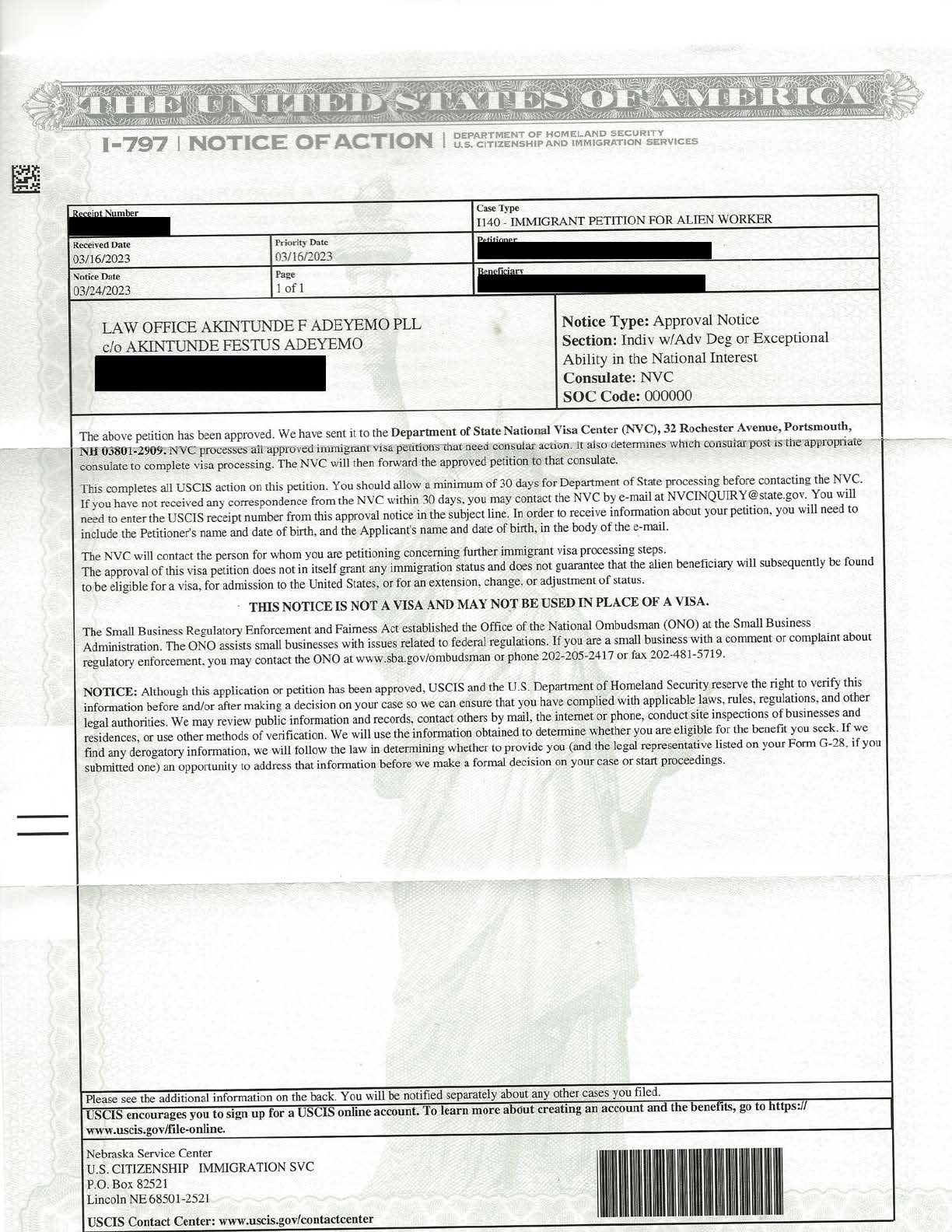YESTERDAY, MY LAW FIRM ACTUALLY WON TWO EB-2 (NIW) CASES: ONE FOR AN IVY-LEAGUE TRAINED LAWYER, THE OTHER FOR AN EXPERIENCED HEALTH ECONOMIST

LATEST WIN FOR THE FIRM
Last night, I talked about the first one. Because my client is currently living and working in Africa (time difference), I wanted to share the news with him first, so I did not share the news on the firm’s blog and other platforms yesterday.
Having shared this life-changing news with my client (a professional in the field of health economics), who was super excited to hear that his EB-2 (NIW) petition was approved by the U.S. Citizenship and Immigration Services (USCIS), I would like to provide more insights into this case.
This case, which I filed on March 10, 2023 (USCIS confirmed receipt on the 16th), was expedited using the premium processing option (USCIS charges a separate fee to adjudicate a case within 45 days).
EB-2 (NIW) is an employment-based second preference (EB-2) - National Interest Waiver (NIW) petition, and it is one of the statutorily approved ways for qualified foreigners to become permanent residents in the U.S., and, subsequently, become U.S. citizens. For EB-2 (NIW), your location is irrelevant (the ultimate question is: can you satisfy the requirements under the Matter of Dhanasar, inter alia)? As you can see, this client hired me from his base in Africa. As indicated on the document, his file will be sent to the National Visa Center (NVC) for consular processing, meaning that their Green Cards will be processed at the appropriate U.S. embassy. For my clients who are in the U.S., their Green Cards will be processed in the U.S.
To support this brief, I submitted 91 exhibits.
My client, whose highest level of education at the time of filing was a master’s degree in health economics, had ZERO citation. My legal brief focused on his work as an expert in universal health coverage and sustainable health financing. Inter alia, documenting his academic and professional achievements, which he accumulated in Nigeria and other countries in Africa, and connecting that to the national interest of the United States, the brief survived all the three prongs.
My brief argued, inter alia, that his proposed endeavor — contributing to improving healthcare resource management and building an equitable healthcare financing system — would be of both substantial merit and national importance and will lead to projected future contributions by solving problems that the United States has deemed to be of both substantial merit and national importance: improving healthcare and advancing an equitable financing system.
My client's work is at the intersections of public health, medicine and economics; therefore, his proposed endeavor, I argued, should be viewed through the lens of public health impact, with domestic and global implications, aligning with the United States' commitment to Sustainable Development Agenda. Because health inequity is a national issue, and because of my client's deep understanding of the different financing systems used to fund healthcare and their associated costs, my brief argued, inter alia, that my client will advance the best interest of the United States.
As a matter of fact, there was no RFE request, for the first legal brief survived all the three elements of the Matter of Dhanasar, 26 I&N Dec. 884 (AAO 2016).
To satisfy the third prong of Dhanasar, relating to the question of whether it would be beneficial to the United States to waive the requirements of a job offer, and thus of a labor certification. In my own opinion, this is the trickiest legal analysis under the Matter of Dhanasar. Having read a lot of denied cases via the Administrative Appeals Office, I usually consider the third prong as equally important as the first two prongs. Here, my legal analysis focused on three of the factors enumerated by the Dhanasar Court: (1) whether, in light of the nature of my client’s qualifications or proposed endeavor, it would be impractical either for my client to secure a job offer or for him to obtain a labor certification; (2) whether, even assuming that other qualified U.S. workers are available, the United States would still benefit from my client’s contributions; and (3) whether the national interest in my client’s contributions is sufficiently urgent to warrant forgoing the labor certification process. I answered in the affirmative. Let me stop there, for now. I don’t want to bore you with the analysis. You can read more about my analysis of the Matter of Dhanasar on the firm’s website.
My client can now focus on his work: the implementation of key activities in health budgeting and planning, as well as health strategic plan development, advancing health equity. This is a big win for my client and his family members (derivative beneficiaries): that is the American dream.
Again, congratulations to my client!
The Law Office of Akintunde F. Adeyemo, PLLC is now accepting new clients in the areas of EB-2 (NIW) and EB-1A.
To read more about EB-2 (NIW), visit: https://www.akinalaw.com/blog/11/a-permanent-residency-option-for-foreigners
To read more about EB-1A, visit: https://www.akinalaw.com/blog/18/eb-1a-frequently-asked-questions
For a free (100%) case evaluation for EB-1A/EB-2 (NIW), contact the attorney-in-charge of The Law Office of Akintunde F Adeyemo, PLLC:
Akintunde F. Adeyemo, Esq.
Attorney, Counselor & Solicitor
734-318-7053 (Call, Text, Including WhatsApp)
Website: www.akinalaw.com
Email address: info@akinalaw.com
***For informational purposes only. Past success does not indicate the likelihood of success in any future legal representation***
***Attorney advertising***



